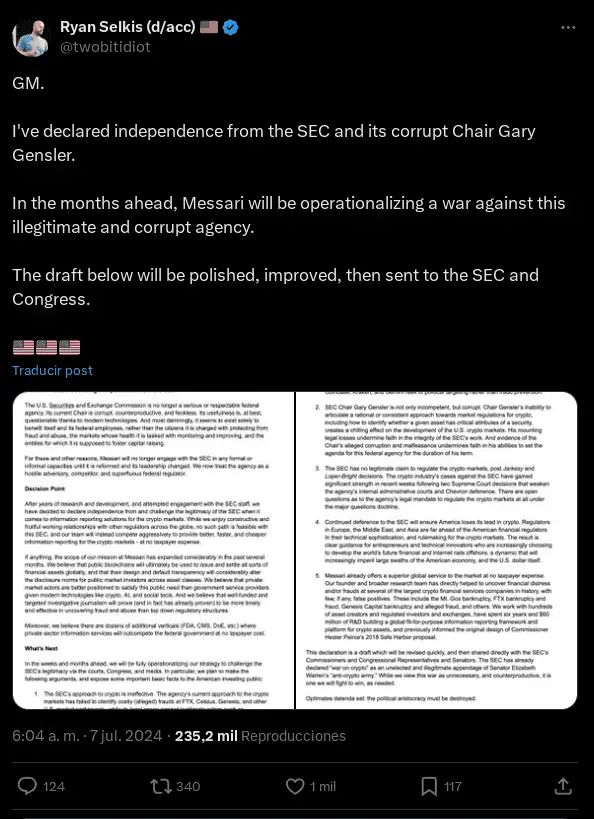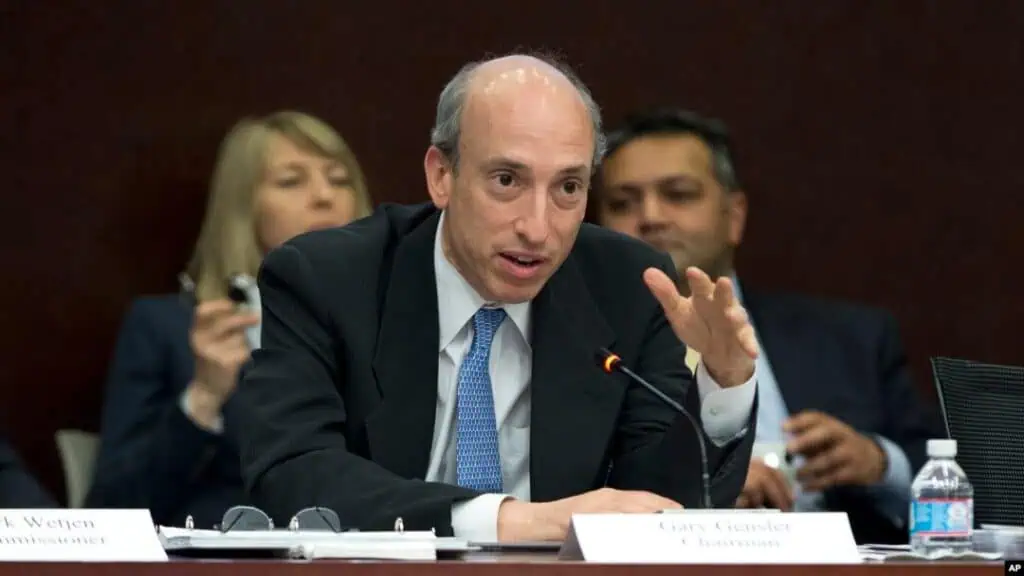
Messari CEO Ryan Selkis has revealed that his company will begin taking legal and informational action against the SEC in an attempt to finally force the creation of regulation for the crypto sector. He also clarifies that Messari will not report anything to the SEC and will not recognize its “legitimacy” in the sector.
In a bold move that has shaken the foundations of the crypto sector, Ryan Selkis, CEO of Messari, a prominent cryptocurrency analytics firm, has declared a “war” against the U.S. Securities and Exchange Commission (SEC). This bold statement marks a turning point in the relationship between the crypto industry and its top regulator in the United States, promising to unleash a series of actions that could redefine the regulatory landscape for cryptocurrencies in the country and, potentially, globally.
The declaration of war against the SEC
Ryan Selkis's "declaration of war" can be seen in a post from your X account, where you can clearly see the entire statement and the reasons for it. In fact, in it you can see that it is not just about going after the SEC using any means possible, but instead we have a concrete and multifaceted action plan designed to challenge the regulatory agency's legitimacy and authority on multiple fronts.

Thus, Selkis has announced that Messari "has declared its independence from the SEC" and that the company "will operationalize a war against this illegitimate and corrupt agency" in the coming months
Key points
In the document, Selkis shows that this war strategy includes several key components, among which he highlights:
- Taking legal action. Messari plans to challenge the SEC’s actions in court, questioning its jurisdiction over cryptocurrencies and challenging its regulatory decisions. This could include direct lawsuits against the SEC or participation in existing cases.
- Exert legislative pressure. Selkis also announced that he will seek to influence Congress to limit the SEC’s powers and promote more favorable regulation for the crypto industry. This could involve lobbying, drafting legislative proposals, and mobilizing public support to pressure lawmakers.
- Media campaign. Selkis has also announced an aggressive communications strategy to expose what he sees as the failings and corruption within the institution. This will include the use of social media, blog posts, media interviews and possibly the production of multimedia content to educate the public about perceived problems with current regulation.
- Operational independence. It will also cut off all contact and cooperation with the institution, refusing to participate in its regulatory processes or consultations. This represents a significant break with the usual practice of cryptocurrency companies seeking dialogue and collaboration with regulators.
- Direct competition. The company will focus on providing information and transparency services for the crypto market that directly compete with the SEC’s functions. This could include creating alternative disclosure standards and reporting platforms for cryptocurrency projects.
Reasons and objectives of Messari's complaint against the SEC
Selkis and Messari's decision to launch this campaign against the SEC is based on several key reasons. First, Selkis argues that the SEC has failed in its primary mission of protecting investors.It notes that the agency has failed to detect and prevent major frauds in the crypto space, such as the collapse of FTX, while at the same time aggressively pursuing companies it deems legitimate and operating in good faith.
On the other hand, Selkis adds that the SEC has done nothing to help put clear and consistent rules in place for the cryptocurrency industry.This lack of clarity creates an environment of legal uncertainty that, according to Selkis, hinders innovation and growth in the sector. And this is no small matter, because the SEC has serious problems with this at this point, something that the community could see with Bitcoin ETFs and their long road to becoming a reality, when other, more dangerous instruments were approved almost immediately.
Another point raised by Selkis is the continued abuse of authority by the SEC. At this point, Selkis accuses the institution of overstepping its powers to regulate cryptocurrencies without a solid legal basis.To this end, it argues that the agency is trying to expand its jurisdiction beyond what the law allows, especially when it comes to classifying cryptocurrencies as securities.
Furthermore, Selkis also believes that the SEC's actions are hindering technological development and US competitiveness in the fintech sector.. He argues that the agency's hostile stance towards cryptocurrencies is leading to innovation and talent moving to other, more favourable jurisdictions. And this stands in contrast to the view we had in the presidential campaign, where Vivek Ramaswamy, Donald Trump and Robert F Kennedy, were more open and inclined to support better crypto regulation, which would help accelerate development and competitiveness in this sector.
Finally, Selkis gives his final blow: directly accuses corruption within the SEC, especially targeting Chairman Gary GenslerSelkis alleges conflicts of interest and potential corruption in leadership are influencing its regulatory decisions.
SEC is going through difficult times
It is no secret that the SEC is going through a very bad time. Gary Gensler's comings and goings have put him not only against companies in the crypto sector, but also against senators and congressmen who have put him in the dock on many occasions from which he has not emerged unscathed.
It is precisely this situation that leads Selkis and other critics to point to the various cases of possible corruption or conflicts of interest under Gary Gensler's leadership, especially in relation to the cryptocurrency industry. Although it is important to note that many of these accusations have not been legally proven, they have contributed to eroding confidence in the integrity of the industry, and more especially in Gensler's image at the helm.

Notable examples include:
- Ethereum case and conflict of interestIn this case, Gensler has been accused of having a conflict of interest due to his previous ties to MIT, where he taught a course on blockchain and where Ethereum has a strong presence. Critics argue that this could explain why Ethereum has been more lenient compared to other cryptocurrencies. The lack of clarity on whether Ethereum is considered a security or not has been a significant point of contention.
- Selective lawsuit against RippleThe SEC sued Ripple for selling XRP as an unregistered security, but has not taken similar action against Ethereum, despite the two having similar initial sales. This has led to accusations of preferential treatment and selective enforcement of the law. The Ripple case has been particularly controversial, with many in the industry viewing the lawsuit as an example of regulation by litigation.
- Hinman case and speeches about Ethereum. William Hinman, former director of the SEC’s Division of Corporation Finance, gave a speech in 2018 suggesting that Ethereum was not a security. Hinman was later revealed to have ties to a law firm that was a member of the Ethereum Enterprise Alliance, raising suspicions of a conflict of interest. This case has been cited as an example of the “revolving doors” between the SEC and the industry it regulates.
- Lack of preventive action in cases of fraud. The SEC has failed to detect or prevent major frauds like FTX, despite red flags. This has led to accusations of incompetence or possible complicity. The collapse of FTX, in particular, has been cited as an example of how the SEC has failed in its mission to protect investors.
- Preferential treatment to certain exchangesThe SEC has been accused of being more lenient with some cryptocurrency exchanges while aggressively pursuing others. For example, the approval of Bitcoin futures ETFs in contrast to the continued rejection of spot Bitcoin ETFs has been pointed to as a possible example of regulatory favoritism or inconsistency.
An open challenge
Ryan Selkis' declaration of war against the SEC marks a significant turning point in the relationship between the cryptocurrency industry and regulators in the United States. It reflects a reality that is impossible to hide: growing frustration with what many in the crypto sector see as unclear, arbitrary and potentially corrupt regulation.
In that sense, Messari’s challenge will likely inspire other companies and industry leaders to take more aggressive stances against regulation perceived as unfair. This could lead to increased pressure to reform the institution and establish a clearer, more favorable regulatory framework for cryptocurrencies.
However, there is also a risk that this direct confrontation could harden the positions of both sides, leading to an even more hostile regulatory environment. The outcome of this “war” declared by Selkis could have far-reaching implications for the future of cryptocurrency regulation in the United States and, by extension, around the world.
Seeking balance for all
Ultimately, the goal should be to find a balance between protecting investors and fostering innovation. This will require constructive dialogue between the industry and regulators, as well as greater transparency and accountability from the SEC. Messari’s challenge could be the catalyst to start this much-needed reform process.
The cryptocurrency industry is at a crucial moment. How this conflict between Messari and the SEC is resolved could determine the future of crypto regulation not only in the United States, but globally. If its goals are achieved, we could see a significant shift towards a more innovation-friendly regulatory framework in the crypto space. On the other hand, if the SEC maintains its current stance, it could lead to further fragmentation of the global cryptocurrency market, with companies and projects seeking friendlier jurisdictions outside the United States.
In any case, this declaration of war by Selkis has highlighted the urgent need to address regulatory issues in the cryptocurrency space. The outcome of this battle could define the future of digital finance and blockchain technology in the years to come.



